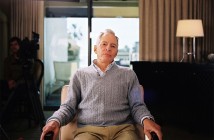Doctor Who, Series 8, Episode 10, “In the Forest of the Night”
October 25, 2014, 7:00 p.m. (EST), BBC
“In the Forest of the Night” is a fairy tale, but not of the sort it first appears to be. Early on, The Doctor tells us “The forest. It’s in every story that kept you awake late at night. The forest is mankind’s nightmare.” We’ve heard lines like this before on the show, mostly in Steven Moffat penned episodes that turn the every day into something terrifying. And on some level, it feels true in some primal sense. Fear of forests is baked into our cultural DNA from way back. They are dark, dangerous places where threats can lurk unseen until they spring upon us. Fear of forests makes sense. Except, not here.
We’ve talked before this series about the way Doctor Who’s constant need to have a monster can sometimes hold the show back from its full potential. “In the Forest of the Night” is an example of exactly what I mean when I day that: it’s an episode without a monster that manages to be thematically rich, character based, and deeply engrossing. It is a bold episode in a season full of them, one in which The Doctor doesn’t just flirt with abandoning humanity to extinction; he does it. Once again, the episode puts Clara front and center, positioning her between Danny’s deep compassion and The Doctor’s aloof utilitarianism. Early on, Clara is so excited by the forest that has grown up around the world, Danny has to keep reminding her they have children to look after. Yet later, faced with The Doctor’s increasingly desperate efforts to save someone from what he thinks is the end of the world, Clara chooses to stay. She chooses to help the kids find their parents. She chooses what she thinks is certain death, because ultimately, she cares. If “Flatline” played around with the idea of Clara becoming The Doctor, “In the Forest of the Night” indicates she can’t, not fully, not ever. Clara can be cold and calculating if the situation requires it, but faced with her own end, she chooses warmth and caring. Last week, she was an excellent Doctor. This week, she is a good person.
“In the Forest of the Night” maintains an impressive tranquility throughout, raising the stakes without ever much bothering with tension. The episode trades so consciously in the mythic, it isn’t concerned about suspense as a driver to the story. This is a fairy tale about the day the trees came to save us all, the day The Madman with a Box went away and the Earth saved itself. As much as this is a story about Clara regaining her perspective on her humanity, the episode feels told mostly from the perspective of Maebh Arden, a little girl whose perspective is so skewed, it doesn’t occur to her to notice that the TARDIS is bigger on the inside. She just expects it is because it’s supposed to be. Maebh could feel like a deus ex machina, like another in a long line of “most important” people The Doctor runs into, but she never does. She feels like a little girl who is lost and scared, but hasn’t yet lost her faith in the world that everything is going to turn out okay. “In the Forest of the Night” isn’t a fairy tale about monsters and the man who comes to save us from them; it’s a fairy tale about a little girl whose hope is rewarded.
To say that this feels like an episode Neil Gaiman would have written is a high compliment to pay first-time Who scribe Frank Cottrell-Boyce, whose script feels magical and mythic without leaning too heavily into either of those elements. It’s the rare Doctor Who episode that feels distinctive for the way its allowed to breathe. This is a show (since the revival, anyway), where the pacing is often cranked up to eleven, where the most commonly heard phrase is probably “Run!” Yet here, the episode feels content to watch these people react to a strange, not immediately deadly threat, and figure out what it might mean. A lesser episode would have leaned more heavily on the government’s efforts to fight the forest, or played The Doctor and the children’s efforts to stop the deforestation plan for greater suspense, but here, those notes are kept to the edges. We all know how this will play out. We all know The Doctor will prevail. Except that he doesn’t.
I suspect the moment when The Doctor leaves the Earth to its extinction will be very divisive among fans of the show, and it is one moment that I wish the episode had played out slightly longer. It doesn’t feel against character to me for The Doctor to decide the situation is hopeless, try to save who he can, and then accept the only person he can save is himself. Yet the episode seems to care so little about the stakes that it becomes hard to believe that this is the situation so intractable, it causes The Doctor to throw up his hands and leave his favorite species to die. It’s a dark moment in a season full of them, but it still feels distinctive. The Doctor isn’t the bad guy here. He isn’t an anti-hero. In fact, his plan to load all of the kids, Danny, and Clara onto the TARDIS and then hightail it (the plan, it should be noted, is actually Clara’s, not that The Doctor notices) is actually one of his most blatantly heroic acts of the season. It does, however, feel like the decision of a very weary man, playing into a side of the character that felt vital to The Twelfth Doctor back in “Deep Breath” but hasn’t been as much of a focus since. The Doctor is willing to fight, but he’s also tired, and more willing to admit defeat when he sees it. This is a Doctor who knows he can’t win them all, and calculates his best route to success with ruthless accuracy.
“In the Forest of the Night” isn’t the best episode of this season. Though its tone is remarkable, it doesn’t ever fully coalesce the way a great story must. It has a great, deceptively simple premise, and then spends its time laying on some strong character work as it plays out its straightforward story of a very bad day narrowly avoided by an ecological miracle. Like many episodes of Doctor Who, it sometimes feels like a story with a lot of ideas and not enough room to use all of them (each kid has a potential emotional arc laid out that is then mostly discarded, the trees can speak through Maebh, but then never do again, etc.). But it manages to feel distinctive and singular nevertheless. It feels like it is operating on its own wavelength. It feels different from what came before and from what is likely to come after (Moffat’s finales are generally big, bombastic puzzle boxes, and the upcoming two-parter looks no different). In other words, it feels like Doctor Who the way its meant to be, an adventure we’re surprised to land in and one we’re not quite ready to leave at its end. And then we hear the sound of the TARDIS preparing to launch, and we’re off. Next stop everywhere.
The Roundup
- “Must’ve been a good year to be a tree.”
- “So, what, do you think that’s how spring begins? With a group message on tree Facebook? Do you think they all send texts to each other?” “You don’t need a phone to communicate, do you? I haven’t phoned home, and I know my mum is worried about me.”
- “You people, you never learn. If a child is speaking, listen to it.”
- “If this is an invasion, it’s over. They’re here. They’ve won. What do they want?” We’ve heard things exactly like this before on the show. And yet, the idea of a story set after the invasion is over is always exciting to me, even if this isn’t that, technically.
- “There are very good, solid scientific reasons for being really quite frightened just now.”
- “They’ve gone. Why does everything have to go?”
- “This really is going to happen, isn’t it?” “Stars implode. Planets grow cold. Catastrophe is the metabolism of the universe. I can fight monsters, I can’t fight physics.”
- “This is my world too. I walk your earth. I breathe your air.” “And on behalf of this world, you’re very welcome. Now go. Save the next one.” This is a callback done very, very well. More evidence of how hard The Doctor is trying to be the better man Clara wishes he was.
- “What do these things have in common?” “They’re really, really scaring us?”
- “I don’t want to see more things. I want to see the things that are in front of me more clearly. There are wonders here, Clara Oswald.”
- “One person is more amazing, harder to understand, but more amazing than universes.”
- “I hope I’m right. It’d be slightly awkward if the world was destroyed at this point.” “What?”
- “It’s the human superpower: forgetting. If you remembered how things felt, you’d have stopped having wars. And stopped having babies.”
“In the Forest of the Night” maintains an impressive tranquility throughout, raising the stakes without ever much bothering with tension.
-
GOOD




